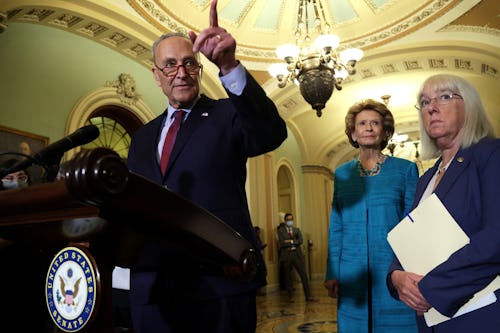
While President Biden was all too happy to settle for an infrastructure bill that sacrificed addressing bigger issues in the name of good, old-fashioned bipartisan agreement on roads and bridges, it looks like Senate Democrats are finally going to go for it with their initial offering on a reconciliation bill. Earlier this week, Democrats passed a $3.5 trillion budget resolution packed with significant spending on all of the country's social infrastructure, including massive new spending to address the looming threat of climate change.
The budget — which was largely written by Sen. Bernie Sanders, according to The Washington Post — includes much of the more ambitious programs that appeared in Biden's original infrastructure bill, before it got stripped for parts by senators reaching across the aisle. It invests billions in education, expands Medicare and the Affordable Care Act, and expands social safety nets for those in need of support through new affordable housing programs and rental assistance.
Crucially, it also pours cash into addressing climate change, and recognizes that the issue is going to touch basically every part of our lives for the foreseeable future. Guiding the budget are two goals established by the Biden administration earlier this year: shifting the nation's energy grid to 80% clean energy, and reducing the country's carbon emissions by half by the year 2030. To help those goals along, the single biggest chunk of spending on the matter is investment in clean energy, with nearly $200 billion going toward expanding renewable energy sources. That includes a mandate for Senate committees to draw up a clean energy standard, which would require future energy production to come from renewable sources.
This absolutely has Sanders's fingerprints all over it. The Vermont senator has been one of the most vocal advocates for the inclusion of a clean energy standard. Sanders previously suggested that he was willing to push for the requirement despite the fact that it was likely to be rejected by the Senate parliamentarian — the rule interpreter for the upper chamber who gets to determine if a proposal can qualify for reconciliation. If the parliamentarian determines that a proposal doesn't directly affect the budget, they can reject it from the proposal. Sanders is basically daring them to do just that.
Also getting a boost to spending: agriculture, which will see most of its expanded budget dedicated to climate-related crises. A total of $135 billion in new spending will go to this sector, with a focus on conservation and reduction of carbon emissions. The agriculture budget also has a carve-out for the Civilian Climate Corps, a concept that has been on Biden and the Democrats' radar since the 2020 election. The program would recruit and employ Americans to help complete federally-funded projects that seek to address climate change.
Basically no part of the budget is without some sort of climate-related spending. The $20.5 billion set aside for Native communities includes energy spending. The $37 billion budgeted to Homeland Security includes funds for procuring green materials for infrastructure projects. Within the $332 billion for housing programs is money earmarked for weatherizing buildings across the country.
This is the type of attention that climate change demands. And while the budget bill is not guaranteed to pass — perpetual party-pooper Sen. Joe Manchin has already voiced concerns about it — it's at least a step in the right direction. Earlier this week, the United Nations warned that we are at "code red for humanity" when it comes to climate change. This decade will be make or break for us. Making it rain cash won't stop the world from burning all on its own, but it can at least set us on track to finally address the problem head on.







